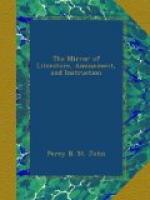On thee, the fountain of goodness relying,
Whatever ills may come—living and dying
I will thy praise proclaim,
Blest be thy holy name.
Blest be thy holy name,
I will thy praise proclaim,
’Tis not for worldly ends we’re contending,
Liberty’s sacred cause we’re defending,
And by thy might on high,
We’ll conquer—or we’ll die!
We’ll conquer—or we’ll die
By the great God on High.
When life’s red stream from my bosom is swelling,
And the last sigh on my faint lip is dwelling,
Then Lord in mercy hear
A youthful warrior’s prayer!
J.E.S.
[2] See “Select Biography,” page 199, present Volume of the mirror.
* * * * *
ENGLAND IN 827, 1827, 2827.
(For the Mirror.)
One thousand years have now elapsed since Egbert laid the foundation of England’s glory, by uniting the kingdoms of the heptarchy. What was England then? what is it now? what will it be in 2827?
In 827, how confined her empire, how narrow her limits, how few her resources; the lord and his vassals the only classes of society. In 1827, she may exclaim with the Spanish Philip, “The sun never sets upon my dominions.” How difficult to mention the bounds of her empire, or to calculate the vastness of her resources! and still more difficult task to enumerate the gradations of society which modern refinement has produced. Where will this extended sway, this power, these resources, and these refinements be in 2827?
“Oh! for the glance of prophet’s
eye,
To scan thy depths, futurity.”
Judging by the fate of nations, they will have passed away like a morning cloud. Look at the fame of Nineveh levelled in the dust. Search for the site of Babylon, with its walls and gates, its hanging gardens and terraces! Contemplate the ghost of the enlightened Athens, stalking through the ruins of her Parthenon, her Athenaeum, or Acropolis. Examine the shadow of power which now remains to the mighty Rome, the empress of the world. Even so will it be with England; ere ten centuries have rolled away, her sun-like splendour will illume a western world. Our stately palaces and venerable cathedrals, our public edifices and manufactories, our paintings and sculpture, will be fruitful subjects of conjecture and controversy to the then learned. And a fragment of a pillar from St. Paul’s, or a mutilated statue from Westminster, will be as valuable to them as a column from the Temple of Belus, or a broken cornice from the Temple of Theseus, is now to us!
D.A.H.
* * * * *
THE ROBIN.
(For the Mirror.)
Hark to the robin—whistling
clear—
The requiem of the dying year—
Amidst the garden bower.
He quits his native forest shade,
Ere ruin stern hath there display’d
Its desolating power.




